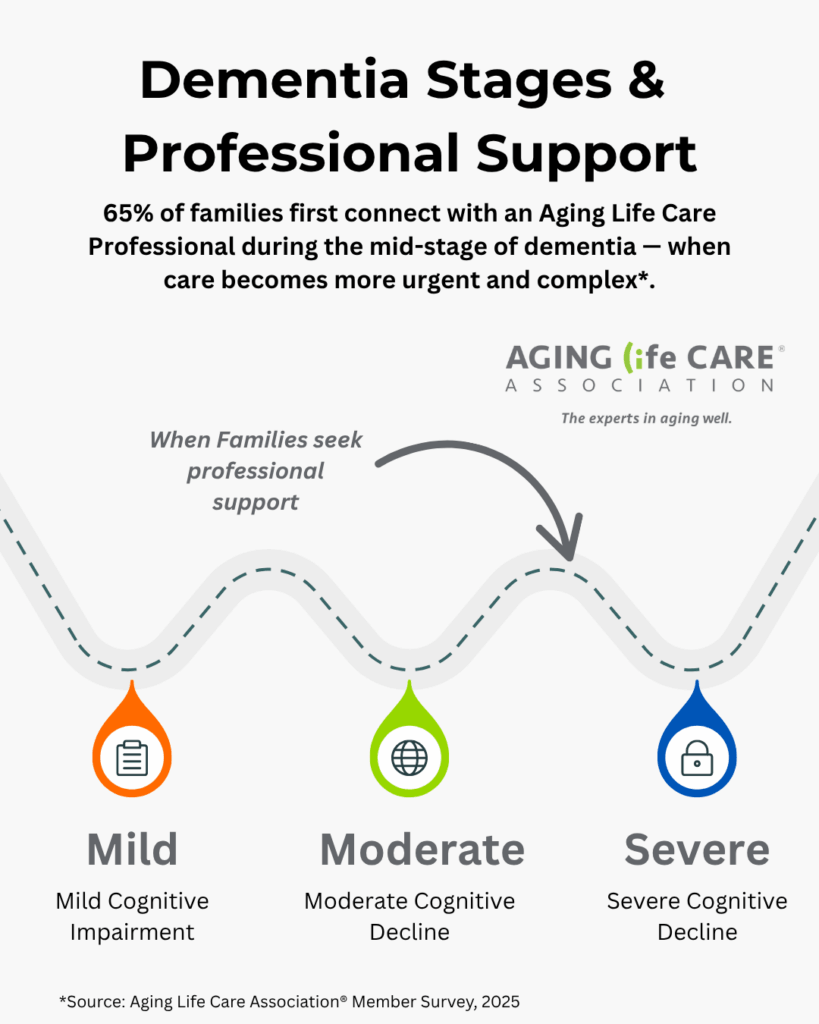
Dementia Diagnosis Are Rising — Here’s How Aging Life Care Managers Are Helping Families Cope
As more families across the country face the reality of a dementia diagnosis, support from an Aging Life Care Manager® is becoming increasingly essential. According to a recent survey conducted by the Aging Life Care Association® (ALCA), more than 70% of Aging Life Care Professionals® serve clients with dementia in over half of their caseloads. Even more telling, 65% of those professionals are called in during the mid-stage of the disease — a time when care needs can quickly become urgent and complex.
“By the time families reach out, it’s often a crisis,” says Elyse Weber-Sacks, a practicing Aging Life Care Manager. “But it doesn’t have to be that way.”
Why Early Planning Matters
The message from Aging Life Care Managers is loud and clear: planning early can drastically improve quality of life. From legal and financial decisions to healthcare coordination, early action puts individuals and families in control.
Survey respondents shared their top advice for families and individuals facing a new dementia diagnosis:
-
Plan ahead – Organize legal, medical, and financial documents.
-
Build a care team – Include a physician, an Aging Life Care Manager, and an elder law attorney.
-
Stay engaged – Prioritize physical, mental, and social activity.
As one Aging Life Care Manager put it: “The earlier you act, the more control you have over your care and quality of life.”

Supporting the Supporters: Caregiver Wellbeing
Caring for someone with dementia can be emotionally, physically, and mentally draining. The professionals surveyed emphasized that caregiver burnout is common.
“Self-care isn’t selfish, it’s survival,” one Aging Life Care Manager shared.
Support for caregivers includes:
-
Help navigating complex healthcare decisions
-
Access to local resources and services
-
Crisis intervention
-
Referrals to resources and support groups
-
Long-term care planning
Aging Life Care Managers step in to help by coordinating care, offering support navigating complex healthcare systems, and helping families prepare for what’s ahead.
A Holistic Approach to Dementia Care
Dementia doesn’t just affect memory, it impacts nearly every aspect of a person’s life. That’s why Aging Life Care Managers take a holistic approach that includes:
-
Referrals to local resources (55%)
-
Crisis intervention (53%)
-
Health and disability support (52%)
-
Navigating family dynamics (34%)
Whether it’s choosing the right living arrangement, creating a safety plan, or navigating family conflict, these professionals bring clarity during what can feel like a chaotic and emotional time.
Recognizing the Signs of Dementia
Early detection of dementia is key to proactive planning. The Alzheimer’s Association outlines ten warning signs:
1. Memory loss that disrupts daily life
2. Difficulty planning or solving problems
3. Trouble completing familiar tasks
4. Confusion with time or place
5. Challenges with visual images and spatial relationships
6. New problems with speaking or writing
7. Misplacing items and inability to retrace steps
8. Poor judgment or decision-making
9. Withdrawal from work or social activities
10. Changes in mood or personality
If you notice one or more of these symptoms in yourself or a loved one, it may be time to reach out for help. An Aging Life Care Manager can assess the situation and guide you through next steps.
Find Help Today
The Aging Life Care Association® has nearly 2,000 members nationwide, Aging Life Care Professionals provide expert support for older adults and their families. With backgrounds in nursing, social work, gerontology, and more, these professionals are uniquely equipped to help during life’s most challenging transitions.
To find an Aging Life Care Manager near you, visit www.aginglifecare.org.
